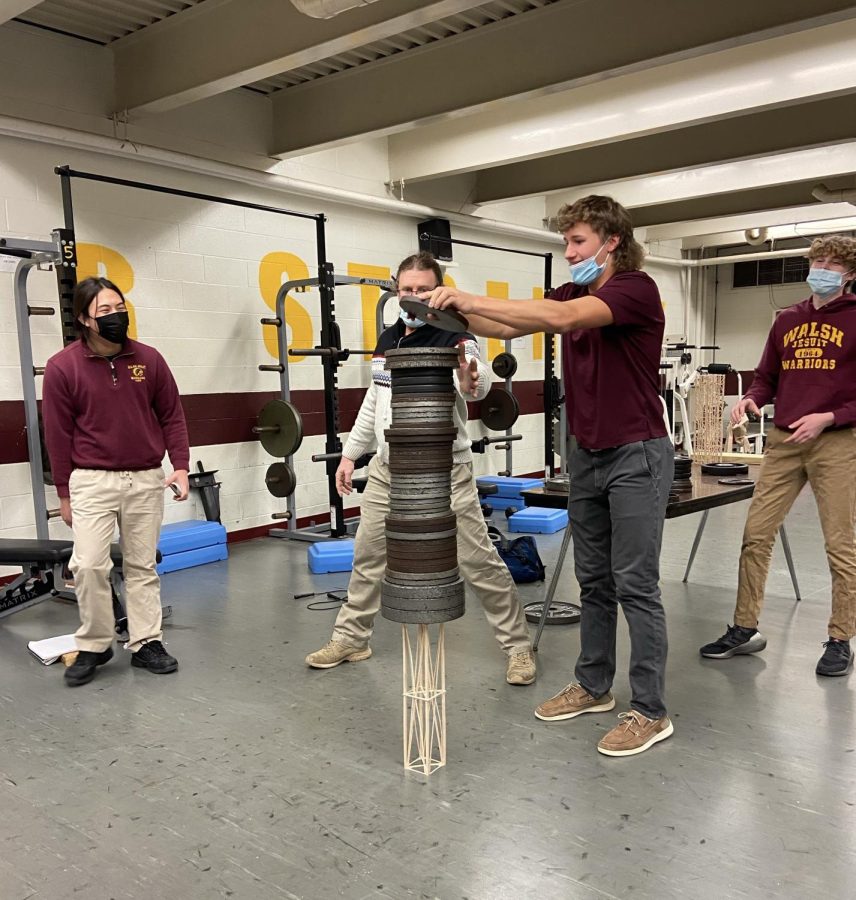What’s that growling at WJ?
Seniors play at the idea of having a stomach growling so loudly it actually draws the attention, and laughter, of others in the Commons.
October 26, 2020
Something odd has been spreading around Walsh Jesuit—and thankfully it’s not Coronavirus related…. I’m talking about stomach growling: a phenomenon that has ailed students since, well, forever!
Picture this: it’s third period, and you’re jotting down notes. The room goes silent for a minute. You haven’t eaten breakfast since seven a.m. Your stomach releases a loud rumble. You feel the stares of your classmates. Keep it together! Only two more periods until lunch!
Sophomores Ryan Zupko and Zach Halligan claim they have never suffered from this embarrassing situation. However, most of us aren’t so lucky.
Bridget Fitzmaurice and Selena Santiago, both sophomores, along with freshman Mya Marshall, agree that this awkward situation has afflicted them. “I find it embarrassing when my stomach growls in class and other people can hear it,” Bridget said.
When empty, a stomach doesn’t care if the room is completely silent—it’ll roar. What is this pesky bodily function? More important, are there ways to stop it?
This uncontrollable rumble is actually called borborygmi. Weird, right? Borborygmi occurs as a result of intestinal muscles contracting in a process known as peristalsis, which is triggered when food enters the digestive system.
Selena specifically complained about experiencing stomach noises after her fifth period lunch. This is an example of peristalsis working as it usually would: to digest food.

Peristalsis can also occur when someone is hungry. The brain, being the wonder it is, releases a hormone triggering peristalsis in order to signal it is hungry. This ultimately causes the empty intestines and digestive muscles to move, creating an unpleasant sound and sometimes discomfort. Borborygmi occurs as a natural side effect of peristalsis. This is one fascinating chain reaction!
Mya stated that sometimes her stomach growls before lunch. She also added that she does not eat breakfast, which is likely the cause of her predicament.
Luckily, there are some life hacks to muffle borborygmi. Obviously, getting in a snack or meal will help defeat these sounds if hunger is the cause. Even something as simple as a granola bar will help. Yet, if you are unable to eat, water may be an answer. Try to carry a water bottle throughout the school day. Additionally, some people resort to the “pressure on the stomach method.” Lightly apply pressure to your stomach, and the rumbles will usually be muffled.
Even so, borborygmi is a normal bodily function. It happens to most of us every now and then. It can be brutal in the moment, but don’t fret. Perhaps you will recall the life hacks listed. Or, even better, laugh at yourself and embrace this very natural phenomenon.






















Makayla Gibbons • Sep 11, 2022 at 11:12 am
I hate when this happens. I like to wear crop tops and shorts in school and 3rd period is the period where I really start thinking about food and I get hungry. And then my stomach growls loudly and all the boys stare at me. So embarrassed.
Makayla Gibbons • Sep 1, 2022 at 6:51 pm
OMG this is so relatable I go to school with my crop top and I think about lunch during class and my stomach hungrily growls SO loudly and it is very embarrassing. The only benefit is that the hot boys stare at me haha